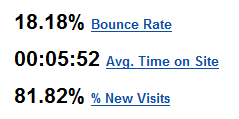How to lower the bounce rate
It is the percentage of visitors who leave the site after having consulted a page, therefore which does not wish to consult another of them. This parameter is essential to know what the visitors think of your site.
First, we must make the difference between bounce rate and exit rate. Bounce rate is the number of visitors leaving the site without looking at a second page.
The exit rate for a page is the percentage of visitors leaving the site after seeing this page. The exit rate is generally more dependent on the quality that the bounce rate.
An example
Here are the statistics provided by the Anaa directory on scriptol.com: bounce rate of 18% and average time on site of 6 minutes.

A bounce rate of 18% can be described as satisfactory on a site where each page provides complete information: visitors having obtained information, want nevertheless to read more pages.
The bounce rate must be evaluated by associating it the time on site: if the bounce rate is low but visitors spend also few time on the site, that would mean that the visitors do not find what they are searching and go quickly from one page to the other. The longer the time on site is and the more a low bounce rate has a positive meaning.
The percentage of new visits is in connection with the percentage of visits
brought by search engines: those bring new visitors while referrals and bookmarks
bring more often same ones. It is also in connection with the expansion of
the visits. Its interpretation thus depends on lot of external factors.
This factor supplements that of the bounce rate, it is better that it is weak
if the bounce rate is high, that indicates visitors found relevant information
even if they read only one page.
Factors for a lower bounce rate
To reduce the rate and thus to keep visitors on the site, the following factors are essential:
- Design.
A pleasant presentation encourages to visit the site. See the article for a quality site. - Loading time.
On a site whose pages take a long time to appear one is incited neither to continue, nor to return. The use of a CMS must be associated to a quality hosting that has reactive databases. - Interest.
When a text is interesting, in good English and without spelling mistakes, one will want to see what the author has written again. - Size of the contents.
Short articles incite to read other pages (but complete texts are more lucky to obtain backlinks and thus new visits). A low rate obtained by shorter articles is only useful if one wants show statistics to others. - External links and advertisements.
If the visitor clicks on a link or a ad, it is lost for the site (temporarily). Pages full of ads at 1 cent the click are thus to proscribe. See the Adsense tutorial about this subject.
Links on external sites are essential and a factor of better position in results of search engines, just avoid those which are not relevant. - Adapting keywords.
The main factor of bounce is the fact that a page on which one arrives does not correspond to what is searched on the search engine. It is so necessary to select keywords which are more appropriate for the contents. - Some sites as dictionaries for example should have high bounce rate while pages are perfectly relevant and informative. This may be improved however with internal links.
Bounce rate is it a ranking factor for search engines?
When Google for example knows the bounce rate of a site, does it make use
of this factor it in his results or do it penalize the site according to whether
the rate is low or high? Does it estimate that a site of which few pages are
visited is not useful, and thus does it inflict penalties to it?
According to some SEO experts, a high rate indicates a lack of relevance and
is thus negative. It is the point of view of a search engine.
If a website has a raised rate, higher than 65%, the webmaster would not use
Google Analytics, which directly provides the information to Google!
However the bounce rate can be known also from clicks in results of queries.
One cannot hide it in Google, one can only try to improve it!
A research about Google and the bounce factor
Does Google make use of the Analytics data? The conclusion of an article I have read about the question is: yes, Google uses the bounce rate to
penalize sites and even it makes use of the data from Google Analytics.
But once the article studied in more detail, I doubt its statistics.
100 users on a site without activity does not mean anything, and they can be
only the arrival of these visitors for the experiment which modifies the
results.
Moreover the author of the article was proved to be related to a supplier of statistics competitor
to Analytics!
As counterexample, about the Anaa directory on this site, its so low bounce rate did not
have any effect on the results of Google one month after Google Analytics
was installed.
An answer from the source
It was given by Matt Cutts: it is not a factor that penalizes a page in the general algorithm. But this was some times ago and the algorithm could has changed since. And if users return to the search page after going on a result, and look at other results, it is a negative signal (for the keywords of the query, at least). It is also preferable that visitors stay on your site.

